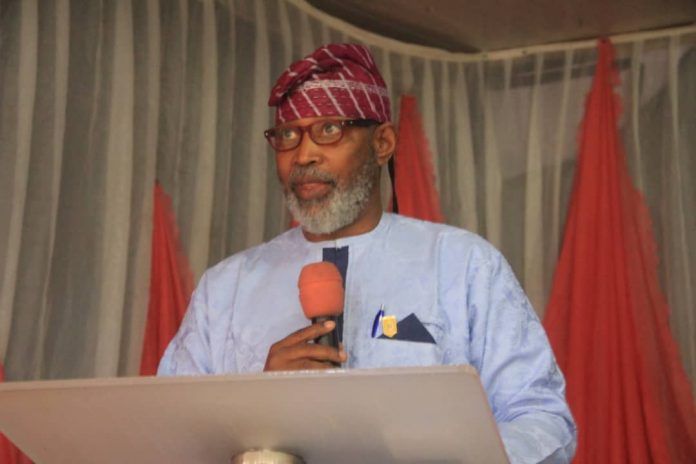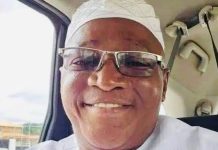
“Tottering on the brink of collapse: Is Restructuring the way out of Nigeria’s Extant Development Crises?”
(Paper prepared for presentation at the 5th Anniversary of The PrecisionNG online newspaper, at Ade Super Hotel, Ilesha Road, Akure, Ondo State, Dec. 12, 2021)
By N. Oluwafemi ‘Femi’ Mimiko, PhD, mni,
Professor of Political Science, OAU.
e-mail: femi.mimiko@gmail.com; nomimiko@oauife.edu.ng @FemiMimiko
- Preamble
I have been asked to speak on the subject, ‘Tottering on the brink of collapse: Is Restructuring the way out of Nigeria’s Extant Development Crises?’ From the framing of the topic, it is easy to cast the problematic. Is Nigeria actually tottering? If yes, is the tottering ‘unto death’ – i.e. leading in the direction of inexorable collapse? Is Nigeria actually facing a development crisis? If yes, what is the nature of this crisis? Is restructuring the way out? What, by the way, is restructuring? What duty have we, as citizens, in all of these? I try to put all of these in context by navigating the evolution of the Nigerian state, as a precursor to a discussion of the nature of its on-going development challenge.
In this presentation, I deploy a harmonization of Structural-functionalism (Almond and Powell, 1966) and state failure (Mimiko, 2013: 119-237) models as framework of analysis. In the Social Sciences, a framework of analysis is like the mold, which ultimately defines the shape of a substance. It is, therefore, understandable why we put much premium on this in social analysis.
Structural-functionalism as a model has evolved over the years and took shape via the pioneering works of Herbert Spencer (Turner, et. al., 2002: 54-89; Offer, 2019); Durkheim (Pope, 1975: 361-379), and Almond and Powell (1966) – in trying to understand the nature and functionality of social formations. It is apt here to the extent that it defines the nature of the intersection between governance structures and their functionality. Thus, if a structure that is saddled with specific functions is itself not appropriately structured, it hardly would be able to carry out the functions purposed for it. It, therefore, implies that a flawed structure cannot but be dysfunctional, a reality, which elsewhere, I characterized as the water stanchion metaphor. If a water stanchion itself is rickety and badly constructed, it hardly would be able to hoist a water tank successfully. When a state presents in this manner, underlined by basic dysfunctionality of its structures, it tends to atrophy, and may transit to outright failure.
The concept of state failure addresses three dimensions of dysfunctionality that a polity may suffer from. A state may either be failing; be inexorably on the path of failure; or have failed. A state is deemed to have failed when it has lost all capacity to govern (Mimiko, 2013: 119-237; 2018). It manifests most pointedly in the emergence of alternative claimants to usage of force, and loyalty of segments of the population; and the virtual absence of the state apparatai in areas and issues that ordinarily are its space. I have argued elsewhere that a state that is also inexorably on the path of failure can as well be regarded as a failed state (Ibid). This occurs when a state hovers precariously on the edge of the social precipice, with no identifiable measure or agency capable of pulling it back. There is no country that is too old or powerful to fail. It is a scientific process: when the conditions precedent to failure exist in a social formation, it is bound to fail – if there are no intervening variables to hold it back.
- The Context: the nature of Nigeria’s development challenge
With a little above 200 million people, Nigeria is Africa’s most populous country; and with a GDP of $448 billion in 2020, it parades the largest economy on the continent. The country has had a tortuous history, marked, among others, by a long drawn out, albeit relatively peaceful, decolonization programme that ended one century of British rule, in 1960. The new country took off as a federal system, with a three regional structure; and although it gave parliamentary dominance to the Northern Region, the largest of the three – contrary to all federalist prescriptions – the system nevertheless afforded the regions very wide latitude for autonomous action. It was thus considered robust enough to lead the new nation through the path of rapid economic development and composite nation-building.
The inability of the immediate post-colonial governing elites to manage the myriad of overlapping cleavages that characterized the new nation, led to the collapse of the nascent democratic system through a January 1966 military coup d’état, whose leaders promised to lead the nation in a new direction, defined by moral rectitude. It soon became clear, however, after a string of military juntas had governed the country for varying numbers of years, that martial rule did not constitute a credible alterative to what it supplanted. The military intruders demonstrated that they also were not immune to some of the failings that paralyzed the civilian administration they were quick to overthrow. Their inability to manage these pressures snowballed into a 30-month civil war, which by the time it ended in 1970, had set the stage for centralization of power in a more secured manner than what prevailed prior the war. In the prosecution of its avowed commitment to greater ‘national unity,’ the military rapidly consolidated power and resources in the central government. Two of the more significant acts in this regard were the creation of States, which served to undermine the federal structure in place prior the first coup d’etat; and the central government’s appropriation of all crude oil resources via the Petroleum Act of 1969. I argue that if the secessionists had envisaged how completely the Civil War was going to be used to consolidate power in the central government, the war would probably not have been fought.
By 1971, the country had become a major crude oil exporter, at an average of two million barrels per day. That same year, it took membership of OPEC, arguably the most leveraged international organization in the world up until the early 1980s. Awash with petrodollars, Nigeria also invariably became the principal player in the global system on issues of import to the African continent.
Even so, rather than be a propellant of national development, crude oil promoted an enclave economy that could not support genuine industrialization and economic development. It indeed became the very bastion of public sector corruption, and a culture of perfunctory commitment to the public good. The import substitution industrialization (ISI), which the humungous earnings from crude oil sales made quite plausible to the nation’s economic planners, soon turned out to be unsustainable, as it was predicated upon sustained importation of completely knocked down (CKD) parts. This became manifest with the virtual collapse of the international crude oil market in the early 1980s, which sent the monocultural economy into a tailspin. In reaction, the country experimented with various demand management economic models, but all with muted success. By mid-1986, the military government of General Ibrahim Babangida gave the nation’s economy a paradigm shift of sort, as it embraced the Structural Adjustment Programme (SAP) – an IMF-inspired neoliberal prescription that privileged market mechanism over the state in national economic organization. Rather than be the propellant of industrial expansion, however, SAP further distorted the nation’s economy.
Complemented by state capture, and the attendant social exclusion; a series of poorly designed and badly implemented policies; rent seeking proclivities; and acute cronyism, these challenges made the country regress rapidly. The initial prospects of speedy economic development of the 1970s – during which the country was listed among the newly industrializing countries (NICs) – fizzled out. By the close of the 20th century, the inability of the Nigerian state to navigate these contours had impoverished a preponderance of the population, deepened alienation, undermined public trust, and greatly hamstrung the nation-building and development agenda.
In 1999, the country embarked upon a new experimentation in democratic governance. While periodic elections have continued to hold since then, with at least one of them consequential enough to propel the defeat of an incumbent president, the prospects of democracy in the country still remain dim. Accounting for this are the negativity spurned by an increasingly fractious elite, a convoluted electoral process, and shifty political party system, among others. Above all, the system continues to be underpinned by mass alienation, consequent upon the inability of the nascent democratic system to engender for the citizenry a more meaningful material existence than hitherto prevailed. Rather than dissipate, historical fault lines have deepened, making the country now considerably less united than it was two decades ago.
The governing elite has demonstrated over the years that it is neither capable of delivering on the promise of national development nor creating the basis for its own, and the state’s legitimacy. Debilitating infrastructure deficit; an opaque policy regime; and at best, growth without development, continue to characterize the state.
- Security, welfare, nation-building and leadership deficits
For the better part of the past two decades, Nigeria has approximated a terrain that is very unsafe for its citizens. They get killed on daily basis by sundry disruptive elements without much consequence for the perpetrators. The UN puts the figure of such victims of violence – the dead – at 350000 (with 314,000 from ‘indirect causes’) in the past decade in which Boko Haram launched its operations (Premium Times, Abuja, June 28, 2021). It is the backdrop against which the Minister of Defence recently exclaimed, in obvious exasperation, that the nation was bleeding (The Nation, April 22, 2021), thus confirming our characterization of the situation much earlier (Mimiko, ‘Our nation is bleeding!,’ Tribune Online, May 23, 2018).
Sundry non-state actors effectively contend with, and often displace the state, on different fronts. Several swatches of the country’s 923,768 sq. km. landscape have regressed rapidly into ungoverned spaces, in which a horde of violent formations impose some form of alternative governance structures – exacting taxes, running markets, and imposing local rulers as they deem fit. The UN Rapporteur to Nigeria, Agnes Callamard (2019) had characterized the security situation in the country as of ‘extreme concern,’ and the country itself as ‘an injustice-pressure cooker,’ with ‘warning signals … flashing bright red!’
It is imperative here to conceive security holistically beyond its better explicated dimension, as national security, to cover human security too. As Jablonsky (2001: 97) notes, human security is ‘a people-centred approach to security that links development to security,…’ It
equates a situation in which the conditions that undermine the personal security, or stoke up fear in the minds of the citizenry are contained or eliminated. It consists in insulation of individuals and communities from circumstances that strike at the very heart of their sense of personal security, including non-existent or marginal access to material means, without which livelihood is practically meaningless. It is a guarantee against, among others, loss of self-confidence and human dignity; attenuation of choices; and highly compromised forms of existence (Mimiko, in Falola and Heaton, 2021, Chapter 31).
The type of situation depicted here hardly prevails in any community in Nigeria of today, not even the Federal Character Territory, which ordinarily should be the most secured, the last bastion of security.
The economy too, in spite of years of crude oil export, has not worked for a majority of the people. Half of the population lives in extreme poverty, and 13.2 million of Nigeria’s children roam the streets. Unemployment among the youths, who constitute more than 60% of the total population, hovers around 33% – all of which give the country the image of a rich country of very poor people (https://www.restlessstories.com/poverties/poverty-in-nigeria).
To the extent that lack of purchase on the part of the state on security and welfare issues cohere to reproduce mutual suspicion, narrow sub-nationalist inclinations, and demonization of diversity, the nation-building agenda of the country, which sought to engender a more attitudinally unified entity out of a complex array of cultural and ethno-national collectives, has practically collapsed. Thus, in addition to the performance deficit of extant structure of governance, are credible historical claims that call to question the correctness and appropriateness, as the case may be, of the current construct represented by the 1999 Constitution (as amended). All efforts at nation-building hitherto undertaken, including, but by no means limited to Federal Character, Quota System, State creation, etc., have not succeeded in further uniting the peoples of Nigeria. The country’s leadership has, in more recent times, wantonly mismanaged its diversity, an element, which in other climes is the very basis of national cohesion, development and strength. This is partly why several non-state actors have emerged, rooting for the disintegration of the country. The fact that this is so suggests the failure of the nation-building agenda the country had pursued since independence in 1960.
The leadership profile of the country has not fared better. Consequent upon the unitary system, which the country fell under with the debut of martial rule, is a huge leadership gap. As we argued elsewhere (Mimiko, ‘Exiting this debilitating quandary,’ Premium Times, Abuja, March 11, 2021),
in the context of a presidential system of government in what effectively equates a unitary system, the fortune of the entire country is determined by the nature, vision, capacity, and degree of autonomy possessed by the faction or fraction of the elite that controls the all powerful central government and the associated apparatuses, at any point in time. The nature of the compromises political practitioners must make to access power under this arrangement, are such that diminish the prospects of emergence of leaders of such quality and commitment requisite for a fresh berth for the country. This is very much unlike the First Republic, where much of governance was organized at the regional level, and thus paraded better possibilities for quality leadership.
The point being made here is that the Nigerian state as presently constituted has demonstrated arrant lack of capacity to deliver on the most basic promise of statehood – i.e. administration of security and welfare, deepening of national unity, and promotion of a leadership recruitment process that emphasizes clarity of vision, social commitment, courage of conviction, and commitment to merit, fairness and inclusivity. Some of the manner in which these structural crises have manifested are corruption, nepotism, cronyism, moral depravity, value migration etc. They are but symptoms of the fundamental structural deformity from which the country suffers.
What all of these depict is a situation of a country in the throes of an existential crisis, describable only in the manner its Vice President did, thus: ‘As a nation, the threats to our corporate existence today are unprecedented and hitherto unimagined!’ (Osinbajo, in Odunsi, Daily Post, Nov. 13, 2021).
- Paradox of dysfunctionality and imperative of restructuring
The fundamental basis of the dysfunctionality captured heretofore lies in the corralling of the highly plural society into a centralised system of government, which not only denies the place of cultural specificities conducive to development, but indeed serves to demobilize the people, thus inhibiting their abilities as individuals and communities to drive their own development outside of the rickety structures of the state.
It is trite that a polity composed of a multiplicity of ethnic nationalities and cultural forms, is best administered with a federal constitution, predicated upon the principle of power sharing among a central government and sub-national units, in a manner in which they all are ‘coordinate and independent’ (Wheare, 1963: 11). The 1999 Constitution (as amended) advertises commitment to this principle; but comes across in its more critical dimensions, as a blueprint for unitary government. To the extent that such a structure is inconsistent with the promise of federalism requisite for effective administration of a plural social formation like Nigeria, it reproduces instability, and poverty rather than development. It is the failure of this governance form, defined by centralization and a thinly disguised unitary system, that informs the advocacy for restructuring.
Restructuring speaks essentially, to an agenda of recasting the governance structure of Nigeria in a manner that moves the latter in the direction of a more robust and functional federal system. It has been demonstrated in the literature on federalism, and in praxis too, that this constitutes the most rational framework for managing a plural social formation. It runs on the most critical element of diversity – ethno-national identity – which can neither be denied nor repressed. In many societies, it indeed constitutes the bedrock, the fulcrum around which governance systems and structures are built, with profoundly beneficial outcomes in terms of equity among ethnic-nations, healthy competition, and domestication of the comparative advantage mantra in development administration.
The compelling nature of this argument informs the gradual transitioning of many countries across the globe, which for different historical reasons started out with unified structures of governance, into some form of federalism, allowing for greater degrees of autonomy to sub-national units. The best known of such is the United Kingdom. It is trite that without this principle of decentralization of power and resources entrenched, the loyalty of the whole population, characterized by different degrees of cleavages – some of them mutually reinforcing – to an overarching central authority, may not be easily procured.
Fundamental to the aspiration for a more equitable and functional federal system in the country, is a modicum of autonomy for the federating units (States or geopolitical zones, as the case may be). Such does not recognise the Local Government as a third tier of government, but adjuncts of the federating units, that can admit of less uniformity in the manner of their administration. This would imply that LGAs would cease being a basis for revenue allocation, and be not listed in the Constitution, giving the leeway to each State to decide on the number and format of governance, at this purely administrative level. The Exclusive legislative list, as currently cast in the 1999 Constitution (as amended), covering all of 68 items, as against just a few ones in the 1960/1963 Constitution, would be recast, and made to focus only on critical items that the central government is in the best position to undertake for the federation – national defence, monetary policy, and foreign relations, among others. As a concomitant of this, the Concurrent list too, itself by every means a clone of the Exclusive list in operational terms, would be whittled down, with a clear direction that all residual matters come under the purview of the federating units.
To the extent that governance can hardly be divested from the mechanism of enforcement, constitutional provisions must be made for the federating units to create and independently manage, each its own police structure. This, albeit, must exist in a clearly defined organisational and operational relationship, consistent with the continued existence, and suzerainty over federal crimes, of the federal police.
Above all, a more equitable fiscal arrangement than what obtains needs be formulated, with the principle of derivation being much more privileged than what currently obtains, delivered in the overall context of fiscal federalism. This, must however, be complemented by entrenched provisions addressing the genuine concerns of the different regions of the nation.
Restructuring also bears direct relevance to the national economy. We had demonstrated elsewhere (Ibid) that ‘a critical nexus exists between governance and economic performance;’ and specifically, that ‘good governance (politics) correlates with social development.’ As Lewis (in NESG, 2018: 5-9) noted, ‘it’s not labels, it’s not the regions, it’s politics’ that brings about the transition of a country from a stagnant economy to a prosperous one.’ Acemoglu and Robinson (Ibid) contend that economic institutions, which invariably are ‘the main determinants of differences in posterity across countries,’ are a function of ‘the nature of political institutions and the distribution of political power in society.’ For Khan (Ibid), ‘governance capacity (the presence of strong institutions to implement strategies) was important to economic growth.’ And for Claude Ake (1989: 54-65), understanding how politics under develops the African economy is the unavoidable starting point in the (under)development narrative.
All of the foregoing are in tandem with our averment that the emergence of a strong developmental state ‘capable of moderating the complex interactions of conflicting social forces, for the ends of inclusive and sustainable development,’ is the antidote to extant dysfunctionality of the Nigerian political economy (Mimiko, 1997: 241-267; Mimiko, 2020). Thus,
unless Nigeria gets the governance structure and its functionality right, all attempts at catalysing economic growth and development in the country, fighting corruption, closing the fault lines, and extirpating ethnicization of politics and politicisation of ethnic, religious, and regional differentiation, may very well come to nought (Ibid).
The point being made here is that Restructuring and its promise of decentralization of powers and resources make for greater inclusivity, less anonymity in government, and equitable allocation of resources. As well, it mainstreams healthy regional competitiveness, more robust accountability, and thus, quality governance and other positive externalities of autochthonous development.
For modus operandi, the 2014 National Conference Report, put together under the Goodluck Jonathan’s PDP government; and the APC True Federalism Committee Report, are quality blueprints that provide a strong basis for a determined and patriotic drive towards restructuring.
- Can Nigeria be salvaged?
Can Nigeria really be salvaged in the light of the foregoing challenges? The possibilities may be limited, and indeed further receding, yet, there is still a modicum of chance that the country can be pulled back from the path of failure. For one, there is so much resourcefulness in the youths of the country, and what they are capable of, and indeed accomplishing, in spite, not because of the Nigerian state. The more of that trend we continue to see, and the more of such individuals get pulled into the public sector, the greater the chances that the Nigerian state may begin to play by more modern rules.
In addition, Nigerians know that the state in which their country is, is not the best; certainly not where it should be, given its array of resources and limitless possibilities. The implication of this is that Nigerians may indeed be ripe for mobilization for such vision of greatness that they crave. What is more, the realities of the failure represented by extant system and way of doing things, is actually the greatest advocacy for an alternative path. An increasing number of the critical stakeholders hitherto disdainful of change in the direction of decentralization – northern governors, the ruling party, and indeed the Federal Government’s own Budget Office – all now are becoming protagonists of restructuring. Recent court rulings on VAT collection, etc., are also helping to sharpen the focus, and underscore the point that the judiciary also has a role to play in the whole enterprise of finding a decentralized, and more rewarding governance structure for Nigeria.
Perhaps of greatest relevance here is the fact that it is becoming increasingly obvious that Nigeria can neither obliterate nor wish away, ethnic identity; but can accommodate and use it as basis for putting in place a more inclusive governance system conducive to the promotion of national unity and composite social development. This is what the experience of countries like the US (where an African-American became president, and a woman of colour is Vice-President; in Canada, where a citizen of Sikh origin is Defence Minister; UK, where an ethnic Pakistani is the Mayor of London; and Ireland, where an Irish of Indian heritage is Prime Minister).
It is also instructive that the Restructuring advocates have succeeded in making the argument sound better – since Confab 2014, where more than 400 individuals from a very disparate, but compelling background, met for about six months; and passed hundreds of resolutions – all on consensus basis. This has served to douse the tension vis a vis whether the proposed restructuring project was meant to elevate some, and put down other ethnic nations, or regions. A most critical manifestation of this new trend is the APC True Federalism Committee Report, which is a virtual clone of the 2014 Confab Report. Important players in the northern part of the country, where the restructuring advocacy would seem to have been most resisted now unequivocally endorse some modicum of restructuring. National leaders like former Vice-President Atiku Abubakar, Governors Aminu Tambuwal and Bello Masari of Sokoto and Katsina States respectively, and Ambassador Babagana Kingibe, among others, all now are on the restructuring train. Again, the most critical factor in this Damascus Road conversion, as it were, is the stark reality that extent system has not only failed, but is indeed incapable of delivering on the promise of peace, stability, security, social development and national unity.
It has become imperative that to stanch the tottering, and bring Nigeria to the path of stability, autochthonous development and unity, some recasting of extant structure of governance in the country, is inevitable.
I often speak of five scenarios that Nigeria may fall into going forward. First, I argue that the country would be lucky to remain in the state of relative paralysis it has occupied for several decades since independence, with not much hope for development, stability, or unity. Secondly, the country may witness a relatively ordered pattern of unravelling, the type both former USSR and Czechoslovakia went through. A third scenario is what I call the Malaysia-Singapore/Gideon Okar state formation model – the determination of a disadvantaged ethno-national constituency to expel a politically dominant minority group, regarded as a drag on development. There is the fourth possibility, of Yugoslavianization – a violent fracturing of the country along existing and newly emerging fault lines, consequent upon complete loss of control over the centrifugal forces plaguing it, by ruling elites not attentive enough to the current of dissatisfaction roiling the land. From this, pockets of social formations, of different degrees of viability and stability, may emerge from the crucible of a bitter and mutually damaging conflict. Finally, as long as Nigeria retains its present dysfunctional structure, Somalianization –– acataclysmic explosion of the country (Mimiko, 2007) – would always be a possibility, which can easily be triggered by a constellation of forces over which critical stakeholders may have lost control.
Nothing here suggests that any one or the other of these scary scenarios is desirable. Rather, they represent an attempt to fathom out possible pathways for Nigeria, from the experience and ‘development’ trajectories of other social formations, which faced similar development crises as the country is grappling with.
- Conclusion
The conclusion is inevitable in the light of the foregoing analysis, first, that extant development crises confronting Nigeria are a function of the dissonance between state and society – failure to get a suitable governance structure for Nigeria’s plural society, thereby aligning the state with the society. Secondly, Nigeria has very limited chances of transcending its array of nation-building and developmental challenges and crises within the context of extant governance structure, defined by wholesale concentration of powers and resources at the centre. Thirdly, restructuring of the nation’s governance structure, if robustly conceived, and properly delivered, would birth a completely new paradigm of state-society engagement requisite for inclusivity, unbounded individual and sub-national creativity, healthy competition between and among the federating units, composite social development across the national landscape, and enduring national unity. Fourthly, insistence by custodians of the Nigerian state to retain its current governance structure, under sundry excuses, will not only deepen extant development crises, but make agitations for secession take a life of their own, and become inexorable. Fifthly, the alternative scenarios Nigeria may fall into if it continues to retain extant governance structure, are such that its current reality of creeping state failure, debilitating as it is, may very well be the best it would be able to attain – a metaphorical child’s play. Sixthly, dealing with the legitimate fears of the antagonists of Restructuring comprehensively and satisfactorily, for the same to abate, and in good enough time, so that the country could indeed restructure before it gets to that proverbial point of no return, is the fundamental challenge before the protagonists of Restructuring.
Nigerians, Africans, and indeed the entire Black race need Nigeria to be one, stable, and strong – with leaders demonstrating complete commitment to the interest of the people; but there is nothing that suggests that any of these alternative scenarios is farfetched. The existential nature of the challenges the country faces today is such that three ordinarily innocuous possibilities may trigger a process with far reaching consequences for the stability and survival of the country. As noted elsewhere (https://twitter.com/FemiMimiko/status/), a Great Power recognition of the secessionist claims of the more vociferous insurgency groups operating across the country, could be a game changer of sort. Decision by any top military officer(s) to desert and lend support to any of these groups would have a similar damaging impact on the integrity of the Nigerian state. A situation in which army generals, and high state officials like State Commissioners, now get killed by insurgents and ‘bandits’ without much of a consequence also portends grave danger for the nation, including a possible reversal of the democratic process, the type now creeping around the entire sub-region. All these underscore the need for positive action in the direction of rebuilding a governance structure that has proven inadequate to address the country’s most pressing developmental crises. This is the sense in which I had argued that solely kinetic response to the type of agitation roiling the land today does not amount to much of a solution (https://twitter.com/FemiMimiko/status/).
It remains to be said that the media has a critical role to play in all of this. It is not without reason that this role is highlighted in the 1999 Constitution (as amended), defective as the document may seem. For the media to deliver on this critical mandate, some of the values that gave journalism its central place in the development process must be brought back. Competence, integrity, sound mind, critical thinking, social commitment, proficiency in language usage, etc., can all not be taken for granted.
It would seem that in addition to all of its advantages as a bedrock of information dissemination in an unprecedentedly democratic manner, social media has contributed in no small measure to the erosion of these values. The degree of irresponsibility in the use of the enormous powers conferred on all and sundry by social media is such that a modicum of regulation, not necessarily control, is needful. I am a protagonist of the view that everyone who must publish for public consumption on social media, as it is with the traditional media, must be accountable, in terms of the veracity of the news and materials published. As things are today, social cohesion, morality, long held values of truthfulness, and many others, have been wantonly discarded on the altar of the social media – which in a technical manner is also a virtually ungoverned space. Such regulation as we advocate can indeed be effected without necessarily hamstringing the usage of this very critical platform.
I congratulate The PrecisionNG on its fifth year anniversary; and thank you all for listening to me.















